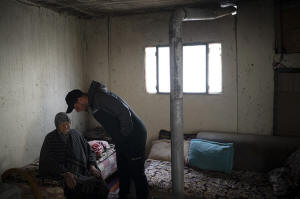Palestinians hope 'No Other Land' Oscar win brings help as they face
possible Israeli expulsion
[March 04, 2025]
By SAM McNEIL
AL-TUWANEH, West Bank (AP) — Just last week, Israeli troops came and
tore down a Palestinian family’s shed in this remote, hilly corner of
the West Bank, residents say. It was the latest instance of destruction
targeting a collection of hamlets whose population is threatened with
expulsion.
Palestinians in the Masafer Yatta area cheered the Oscar win of the
documentary “No Other Land,” which depicts life in the beleaguered
community, and hoped it will bring them some help.
In al-Tuwaneh, one of the hamlets that make up Masafer Yatta, Salem Adra
said his family stayed up all night for the Oscar ceremony. They watched
as his older brother, Basel Adra, the film’s co-director, came on stage
to accept the award for best documentary.
“It was such a huge surprise, such joy,” he said.
“No Other Land” follows Basel Adra as he risks arrest to document the
destruction of Masafer Yatta at the southern edge of the
Israeli-occupied West Bank, joined by his co-director, Israeli
journalist and filmmaker, Yuval Abraham.
The joint Palestinian-Israeli production has won a string of
international awards, starting at the Berlin International Film Festival
in 2024. Five years in the making, it gained greater resonance amid
Israel’s devastating military campaign in Gaza that forced almost its
entire population from their homes, as well as increasing raids in the
West Bank that have caused the displacement of tens of thousands of
Palestinians.
At the same time, the film has raised hackles in Israel, scarred by the
bloody the Oct. 7, 2023 attack by Hamas that triggered the war.

Salem Adra, who at times helped his brother film for the movie, said he
hoped the Oscar win “opens the world’s eyes to what’s happening here in
Masafer Yatta.”
“It’s a win for all of Palestine and for everyone who lives in Masafer
Yatta,” he said.
He said that since the film was first released, threats and pressure
against his family have increased. Their car has been stoned by
settlers. After the movie won an award at the Berlin International Film
Festival a year ago, the military returned over and over to the family
home, and once detained his father, searching his phone and asking, “Why
are you filming?”
The Israeli military designated Masafer Yatta as a live-fire training
zone in the 1980s and ordered residents, mostly Arab Bedouin, to be
expelled. Israel said the Bedouin did not have permanent structures in
the area. But families say they have lived and herded their sheep and
goats across the area long before Israel captured the West Bank in the
1967 Mideast war.
After a 20-year legal battle by residents, Israel’s Supreme Court upheld
the expulsion order in 2022. The around 1,000 residents have largely
remained in place, but troops regularly move in to demolish homes,
tents, water tanks and olive orchards — and Palestinians fear outright
expulsion could come at any time.
Salem Adra said the latest destruction came Wednesday, when troops tore
down the shed of a family in a nearby hamlet.
Standing on a stony ridge above al-Tuwaneh, Salem Adra said Jewish
settlers backed by the military have set up 10 outposts around the
village since Oct. 7, 2023.
[to top of second column]
|

A Palestinian girl walks on a road in the West Bank village of
Tuwani, Monday, March 3, 2025. (AP Photo/Leo Correa)
 Shepherd Raed al-Hamamdeh, 48, led
his herd of goats across the rocky land. He pointed to one outpost —
with tents and a trailer flying the flag of an Israeli military unit
— on the other side of a small valley. Farmers no longer tend the
olive grove in the valley for fear of being attacked.
Al-Hamamdeh said the military uses drones to drive off herds if they
get too close to the outposts. “Settlers attack. When we herd sheep,
we can’t go far as you can see. Only up to this point can we reach,”
he said. He pointed to the rubble of a house that he said settlers
had destroyed, driving out the family and burning their furniture.
In Israel, the film garnered little media attention since its
release — and what attention it did get has been angry. When it won
the documentary prize at the Berlin festival, its Israeli director
Abraham came under fire for an acceptance speech that called for an
end to the war in Gaza without mentioning Hamas’ initial attack and
taking of the hostages held in Gaza.
In his Oscar acceptance speech, Abraham spoke of both. But that did
little to calm criticism in Israel. Culture and Sports Minister Miki
Zohar called the win “a sad moment for the world of cinema.” He said
the film distorted reality and accused its creators of using
“defamation” of Israel as a way help promote the documentary.
Usually, Israeli films that are nominated for prestigious
international prizes receive boastful accolades in Israel.
But after the Hamas attack, “everyone is in mourning or in trauma,
we can hardly hear any other voice on any other subject,” Raya
Morag, a professor at the Hebrew University of Jerusalem who
specializes in cinema and trauma, said last week.
On Monday, she said it wasn’t yet clear if the win will bring the
documentary more attention in Israel. But, she said, “it won’t be
possible for people to ignore the message of the two directors,
including for people that haven’t seen the film.”
In his acceptance speech Sunday night, Basel Adra called on the
world “to stop the injustice and to stop the ethnic cleansing of
Palestinian people.”
He said he hoped his newborn daughter would “not have to live the
same life I am living now … Always feeling settler violence, home
demolitions and forceful displacement.”
On Monday, his brother Salem walked down from the ridge along with
his 4-year-old son to a family home.
He checked the CCTV cameras the family has set up around the house
to watch for settlers. They were still filming.
----
AP writers Omar Akour in Amman, Jordan, and Melanie Lidman and Tia
Goldenberg in Tel Aviv, Israel, contributed to this report.
All contents © copyright 2025 Associated Press. All rights reserved
 |